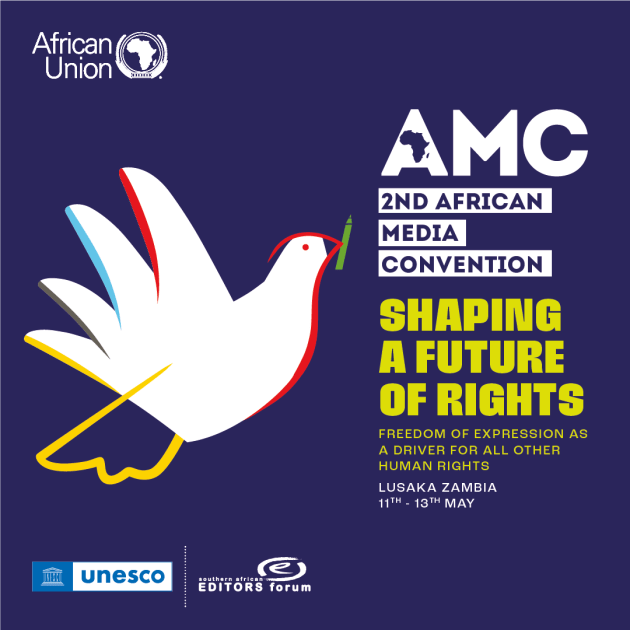|
Getting your Trinity Audio player ready…
|
African editors, journalists and media stakeholders are to craft a future of rights on the continent at the 2nd Africa Media Convention (AMC) scheduled for Lusaka, Zambia from 11-13 May 2023.
Under the 2023 World Press Freedom Day (WPFD) theme: Shaping a Future of Rights: Freedom of Expression as a driver for all other human rights”, the more than 300 participants will also interrogate the following sub-themes:
- Shaping Legislative Rights: A repeal of repugnant statutes that impinge on ethical and fearless journalism,
- Shaping just and favourable conditions of work: the right to a minimum wage, mental health and safety for journalists,
- Shaping a future of the right to viable media and sustainable journalism: The equitable sharing of revenues by digital companies to support ethical journalism and information as a public good,
- Shaping a future of rights: Making freedom of expression, access to information and the safety of journalists key indicators in the African Peer Review Mechanism (APRM) process,
- Shaping a future of rights to freedom, justice and peace: creating enabling and inclusive environments for women journalists, their safety and freedoms,
- Shaping a future of journalism: Addressing rights of journalists in the age of Generative Pre-Trained Transformed AI.
The 2nd African Media Convention will be hosted by the Southern Africa Editors’ Forum (SAEF) and the 16-member Media Liaison Committee (MLC) in Zambia, under the auspices of a steering committee and subcommittees drawn from Media stakeholders, UNESCO and the African Union Commission. The first such Convention was held in Arusha, Tanzania in 2022 and was hosted by the East African Editors Society (EAES) and the Tanzania Editors’ Forum (TEF).
The event is aligned with the 2023 global WPFD event to be held in New York, USA marking 30 years since the UN General Assembly’s decision to proclaim May 03 as an international day for press freedom. The proclamation followed a recommendation by African editors, senior journalists, and media educators who met in Windhoek at a UNESCO Seminar in 1991.
The continent–wide media event will be officiated by the President of Zambia H.E Hakainde Hichilema while the previous event which took place in Arusha in 2022 was graced by the presence of the Tanzanian President H.E Samia Suluhu Hassan, raising the stakes of the important role of the media and the support of African Heads of State.
The 2nd African Media Convention comes shortly after the first Press Freedom and Safety of Journalists’ Assessment Report in Africa was released in November 2022, indicating a mixed bag of achievements and challenges.
Some of the positive strides include the adoption of the AU Convention on Cybersecurity and Data Protection, the revised African Commission on Human and Peoples’ Rights (ACHPR) Declaration of Principles on Freedom of Expression and Access to Information in Africa (2019) and the growth and emergence of new media across the continent.
In addition, Africa was home to the adoption of the Windhoek+30 Declaration in 2021, which stresses the need for all governments to create positive enabling environments for freedom of expression, and access to information, both online and offline, in line with international guarantees of these rights.
However, while there are countries that have made commendable progress in line with the above principles and Declarations, there are still many retrogressive laws in some countries that impede media freedom and freedom of expression, and that do not conform with regional and international standards.
Furthermore, across the continent, several journalists and online content creators have been arrested, detained and some prosecuted or even killed. The authorities have largely relied on the retrogressive laws and/or penal codes to do this.
Trolling and online harassment of journalists, especially female journalists is increasingly becoming commonplace.
To counter these critical situations and threats, African editors, journalists and media stakeholders will meet in Lusaka to spotlight the link between press freedom, and freedom of expression as a driver of other freedoms and human rights.
The need for the continent to align to the Declaration of Principles of Freedom of Expression and Access to Information in Africa is more urgent than ever, as it is to highlight best practices across the continent. These principles anchor the rights to freedom of expression and access to information in conformance with Article 9 of the African Charter, which guarantees individuals the right to receive information as well as the right to disseminate information.
A Declaration is to be issued at the end of the Convention on the main theme and the six sub-themes.
SOURCE: U NESCO
